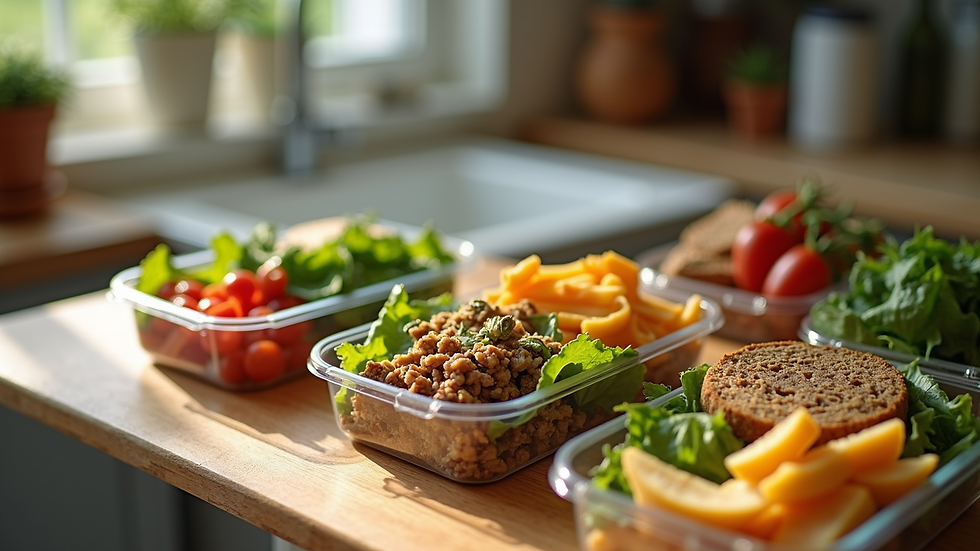How Proper Nutrition Can Boost Your Fitness Results
- Michael Alvarez

- Jul 14, 2025
- 4 min read
In the world of fitness, many people often overlook the importance of proper nutrition. While regular exercise and a great workout routine are essential, what you eat significantly impacts your performance and results. Whether you are training for a marathon or simply trying to get fit, understanding the connection between nutrition and fitness can help you achieve your goals more effectively.
The Role of Proper Nutrition in Fitness
Proper nutrition defines the fuel you give your body. Just like a well-maintained car requires quality fuel to run efficiently, our bodies depend on nutritious foods for optimal performance. The right balance of macronutrients (proteins, fats, and carbohydrates) and micronutrients (vitamins and minerals) is crucial in enhancing strength, endurance, and recovery.
A study published in the Journal of the International Society of Sports Nutrition suggests that athletes who maintain a balanced diet improve their performance outcomes and recovery. Specifically, proper nutrition can reduce fatigue and increase energy levels during workouts. Therefore, paying attention to your diet will not only enhance your fitness results but also improve your overall well-being.

Understanding Macronutrients
Macronutrients are the nutrients that provide your body with energy. They consist of three main categories: carbohydrates, proteins, and fats. Each macronutrient plays a unique role in fitness and recovery, making it essential to include all three in your diet.
Carbohydrates
Carbohydrates are the body's primary energy source. They provide glucose, which fuels your workouts, especially during high-intensity exercises. Aim to incorporate complex carbohydrates, such as whole grains, brown rice, and oats, into your meals. These options digest slowly, providing sustained energy.
To illustrate, consider an athlete preparing for a long-distance run. Consuming a meal rich in complex carbs the night before the event can fuel their muscles and enhance their performance.
Proteins
Proteins are vital for muscle repair and growth. After an intense workout, your muscles need protein to recover. Foods rich in protein, such as lean meats, fish, eggs, and plant-based options like beans and lentils, should be a cornerstone of your post-workout meals.
Research indicates that athletes should consume approximately 1.2 to 2.0 grams of protein per kilogram of body weight to promote muscle synthesis. Ensuring adequate protein intake is critical for achieving your fitness goals.
Fats
Fats are another essential macronutrient vital for hormone production and nutrient absorption. However, it's important to choose healthy fats, such as those found in avocados, nuts, and olive oil. Consuming these fats can provide long-lasting energy, especially for endurance athletes.
In general, including a healthy balance of fats, proteins, and carbohydrates will optimize your performance and enhance your fitness journey.

How to Structure a Nutrition Counseling Session?
If you're feeling overwhelmed or uncertain about how to improve your nutrition for fitness, consider reaching out for guidance. A nutrition counseling session with a registered dietitian can help you develop a personalized nutrition plan based on your fitness needs and goals.
During a typical counseling session, the dietitian will assess your current eating habits, discuss your fitness objectives, and create a tailored meal plan. They may also provide educational materials about the importance of nutrition and its impact on your physical performance. Additionally, you could explore portion sizes, meal timing, and any specific dietary restrictions you may have.
It's crucial to come prepared with questions and thoughts about your dietary habits. This dialogue can provide valuable insight into how to align your eating habits with your fitness goals.
Hydration and Fitness
You’ve probably heard the saying, "You are what you eat." However, it's just as important to consider what you drink. Staying hydrated is vital for both fitness performance and recovery. Water plays a starring role in virtually every physiological process in the body, including nutrient transport and thermoregulation.
Aim to drink sufficient water before, during, and after your workouts. The American Council on Exercise recommends that individuals drink 17-20 ounces of water two hours before exercising, 8 ounces during exercise, and 16-24 ounces after a workout.
If you're engaging in prolonged physical activity or exercising in hot conditions, electrolyte drinks can also help replenish essential minerals lost through sweat. Maintaining optimal hydration can significantly boost your workout performance and recovery time.

Meal Timing and Fitness
Meal timing is a crucial aspect of nutrition that often goes unnoticed. Consuming the right foods at the right time can enhance performance and recovery.
Before Exercise
Feed your body with the right nutrients before exercising. Aim for a meal that combines carbohydrates and protein about 1-3 hours before your workout. This will ensure you have the energy needed for an effective session. For example, a banana with peanut butter or a whole-grain sandwich with turkey can be great pre-workout meals.
After Exercise
Post-workout nutrition is equally important. Consuming a meal that contains protein and carbohydrates within 30 minutes to two hours after your workout can help repair muscle damage and replenish your energy stores. A smoothie made with protein powder, fruits, and spinach can be a quick and nutritious option.
In summary, strategically timing your meals around your workout can have a remarkable impact on recovery and performance.
Final Thoughts on Nutrition and Fitness
Understanding how proper nutrition can boost your fitness results is crucial for anyone looking to improve their health and performance. By focusing on balanced macronutrients, staying hydrated, and timing your meals correctly, you can enhance your workouts and recovery significantly.
Don’t hesitate to seek professional advice through a nutrition counseling session. A qualified professional can provide personalized guidance tailored to your individual needs and goals. Making informed nutritional choices will empower you to maximize your fitness results and lead a healthier lifestyle.



Comments